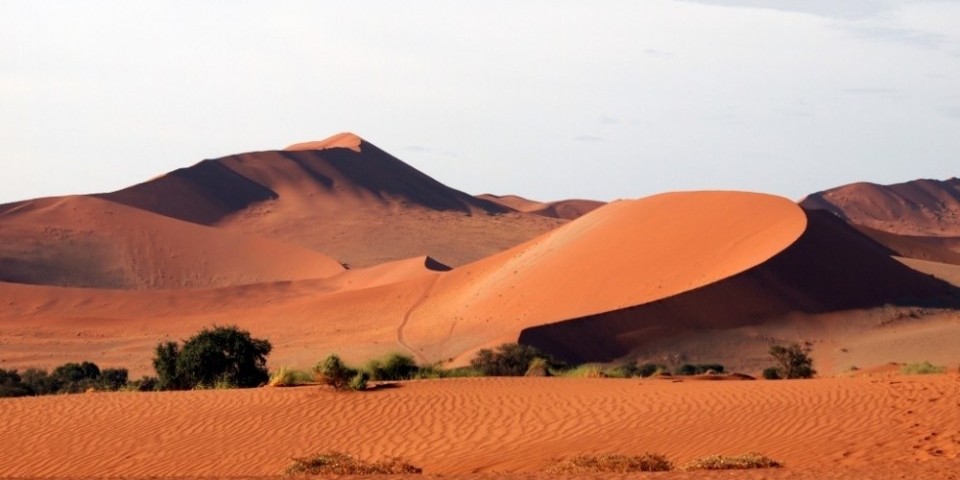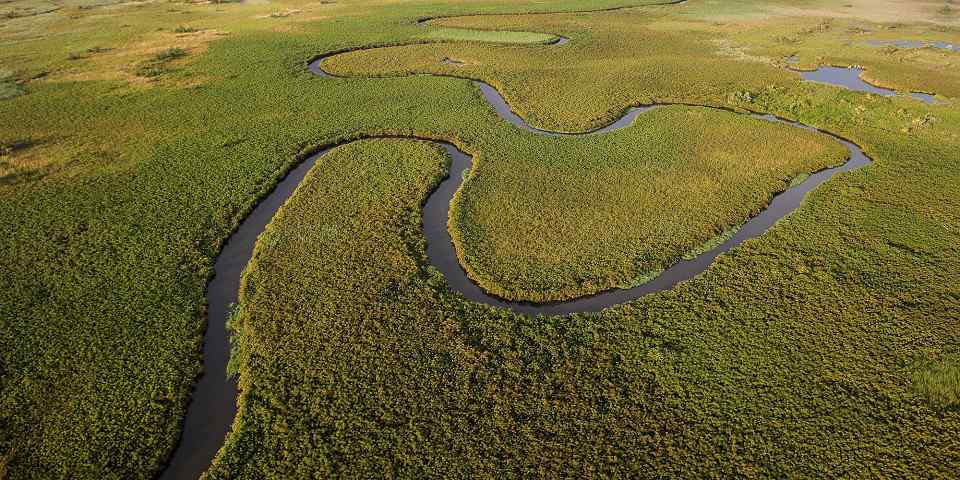Tour Length
Rates in USD $ – Change Currency
Per person, excl. international flightsOperator Rating
Other Tour Features
Filter by Operator
Filter by Accommodation
African Overland Tours & Safaris
Traveling as part of an overland safari is something of a rite of passage for travelers to Africa. And it’s a fabulous introduction to the continent. It may not be for everyone. The low-budget feel, the close and relentless proximity with other travelers, and the sense of always being on the move doesn’t suit every traveler. But traveling in this way has many upsides. This includes the opportunity to see as much of Africa as you can while spending as little money as possible. Most likely, it’s the sort of epic trip that will stay with you for a lifetime. And it may perhaps even sow the seeds of a passion for the continent that will last just as long.
-
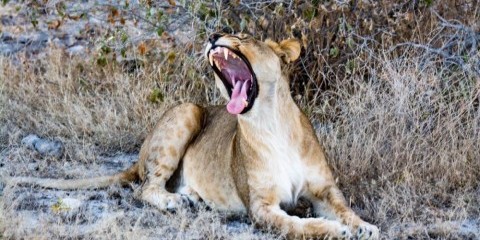
7-Day Namibia Highlights
$2,074 pp (USD)
Scheduled Start DatesNamibia: Shared tour (max 10 people per vehicle)
Mid-range Lodge & HotelYou Visit: Windhoek (Start), Etosha NP, Damaraland, Sesriem (Town), Sossusvlei (Sand Dunes), Windhoek (End)

Indigo Safaris
4.8/5 – 157 Reviews
-
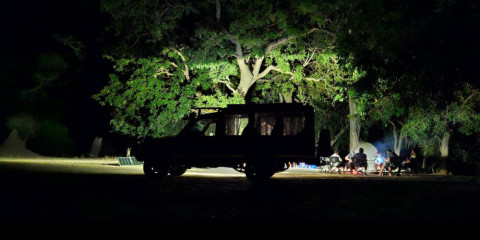
12-Day Glamping Vfl-Hwange-Kariba-Sail-Mana-Chitake-Hre
$3,969 pp (USD)
Scheduled Start DatesZimbabwe: Shared tour (max 8 people per vehicle)BudgetCamping
You Visit: Victoria Falls Town (Start), Hwange NP, Lake Kariba, Matusadona NP, Mana Pools NP, Chitake Springs (Mana Pools NP), Harare (End)
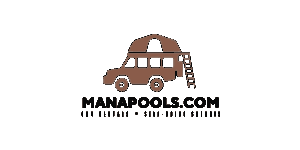
Mana Pools Tourism Services
5.0/5 – 40 Reviews
-
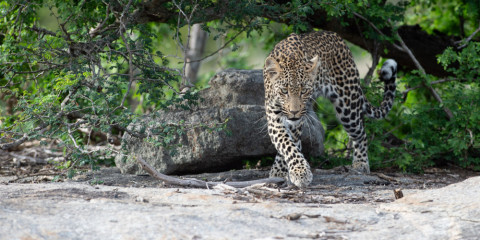
14-Day Botswana Wild Side
$2,487 pp (USD)
Scheduled Start DatesBotswana, Namibia, South Africa & Zambia: Shared tour (max 12 people per vehicle)BudgetCamping & Lodge
You Visit: Johannesburg (Start), Khama Rhino Sanctuary (Rhino Sanctuary), Maun (City), Okavango Delta, Moremi GR (Okavango Delta), Savuti (Chobe NP), Chobe NP, Kasane (Town), Livingstone (End)

Sunway Safaris
4.8/5 – 37 Reviews
-
Top Rated Operator

3-Day Tarangire, Ngorongoro and Manyara National Park
$1,375 pp (USD)
Tanzania: Shared tour (max 6 people per vehicle)BudgetLodge
You Visit: Arusha (Start), Tarangire NP, Ngorongoro Crater, Arusha (End)

Going Green Safari Tours
4.9/5 – 188 Reviews
-
![4-Day 3 Nights Overland Camping Tsavo & Amboseli Safari]()
4-Day 3 Nights Overland Camping Tsavo & Amboseli Safari
$704 pp (USD)
Scheduled Start DatesKenya: Shared tour (max 26 people per vehicle)BudgetCamping
You Visit: Nairobi (Start), Tsavo East NP, Tsavo West NP, Amboseli NP, Nairobi (End)

Bobu Africa
5.0/5 – 6 Reviews
-
![3-Day Denakil Depression]()
3-Day Denakil Depression
$659 pp (USD)
Ethiopia: Shared tour (max 4 people per vehicle)BudgetCamping
You Visit: Semara (Start), Erta Ale Volcano (Danakil Depression), Danakil Depression (Highlight), Semara (End)

Liyu Ethiopia Tour and Travel
5.0/5 – 23 Reviews
-
![2-Day Kruger National Park]()
2-Day Kruger National Park
$385 to $413 pp (USD)
South Africa: Shared tour (max 6 people per vehicle)
Mid-range HotelYou Visit: Johannesburg (Start), Kruger NP, Johannesburg (End)

Pure Diamond Tours and Safari
4.5/5 – 8 Reviews
-
Best Seller

6-Day Wildlife & Dunes Experience
$1,872 pp (USD)
Scheduled Start DatesNamibia: Shared tour (max 10 people per vehicle)
Mid-range Lodge & HotelYou Visit: Windhoek (Start), Etosha NP, Swakopmund (City), Sesriem (Town), Sossusvlei (Sand Dunes), Windhoek (End)

Indigo Safaris
4.8/5 – 157 Reviews
-

17-Day South Africa Rainbow Route
$3,066 pp (USD)
Scheduled Start DatesSouth Africa & Eswatini: Shared tour (max 12 people per vehicle)
Mid-range Lodge & Tented CampYou Visit: Johannesburg (Start), Greater Kruger, Kruger NP, Malolotja NR, Zululand (KwaZulu-Natal Province), Royal Natal (Drakensberg Mountains), East London (City), Addo Elephant NP, Knysna (Garden Route), Hermanus (Whales), Cape Town (End)

Sunway Safaris
4.8/5 – 37 Reviews
-
![4-Day Northern Kenya Easter Overland Camping Safari]()
4-Day Northern Kenya Easter Overland Camping Safari
$704 pp (USD)
Scheduled Start DatesKenya: Shared tour (max 26 people per vehicle)BudgetCamping
You Visit: Nairobi (Start), Meru NP, Buffalo Springs NR, Aberdare NP, Mt Kenya, Nairobi (End)

Bobu Africa
5.0/5 – 6 Reviews
-

7-Day Northern Namibia Adventurer
$1,619 pp (USD)
Scheduled Start DatesNamibia: Shared tour (max 10 people per vehicle)BudgetCamping & Hotel
You Visit: Windhoek (Start), Okonjati GR, Etosha NP, Damaraland, Cape Cross (Seals), Swakopmund (City), Windhoek (End)

Indigo Safaris
4.8/5 – 157 Reviews
-

14-Day Walking Safari in South Africa and Swaziland
$2,445 pp (USD)
Scheduled Start DatesSouth Africa & Eswatini: Shared tour (max 12 people per vehicle)
Mid-range Lodge & Tented CampYou Visit: Johannesburg (Start), Mpumalanga Province, Greater Kruger, Malolotja NR, Zululand (KwaZulu-Natal Province), Isandlwana (KZN Battlefields), Royal Natal (Drakensberg Mountains), Drakensberg Mountains (Mountain Range), Johannesburg (End)

Sunway Safaris
4.8/5 – 37 Reviews
-

9-Day Namibia's Wildlife, Coast and Dunes Safari
$2,296 pp (USD)
Scheduled Start DatesNamibia: Shared tour (max 12 people per vehicle)BudgetCamping & Hotel
You Visit: Windhoek (Start), Okonjati GR, Etosha NP, Palmwag Concession (Damaraland), Cape Cross (Seals), Swakopmund (City), Sesriem (Town), Sossusvlei (Sand Dunes), Windhoek (End)

Indigo Safaris
4.8/5 – 157 Reviews
-
![13-Day Botswana Trans Kalahari Camping Safari]()
13-Day Botswana Trans Kalahari Camping Safari
$2,297 pp (USD)
Scheduled Start DatesBotswana & South Africa: Shared tour (max 12 people per vehicle)BudgetCamping
You Visit: Johannesburg (Start), Serowe (Town), Kubu Island (Makgadikgadi Pans NP), Makgadikgadi Pans NP, Maun (City), Okavango Delta, Central Kalahari GR, Khama Rhino Sanctuary (Rhino Sanctuary), Johannesburg (End)

Sunway Safaris
4.8/5 – 37 Reviews
-

4-Day Swakopmund & Sossusvlei Adventure
$1,161 pp (USD)
Scheduled Start DatesNamibia: Shared tour (max 10 people per vehicle)
Mid-range Hotel & Self Catering AccommodationYou Visit: Windhoek (Start), Swakopmund (City), Sesriem (Town), Sossusvlei (Sand Dunes), Windhoek (End)

Indigo Safaris
4.8/5 – 157 Reviews
-
![15-Day Zambia and Namibia Camping Safari]()
15-Day Zambia and Namibia Camping Safari
$2,473 pp (USD)
Scheduled Start DatesNamibia & Zambia: Shared tour (max 12 people per vehicle)BudgetCamping & Guest House
You Visit: Livingstone (Start), Victoria Falls, Zambezi Region, Rundu (City), Etosha NP, Brandberg Mountain (Rock Art), Spitzkoppe (Damaraland), Swakopmund (City), Namib Desert, Windhoek (End)

Sunway Safaris
4.8/5 – 37 Reviews
-

9-Day Namibia's Best of North and South Safari
$2,296 pp (USD)
Scheduled Start DatesNamibia: Shared tour (max 10 people per vehicle)BudgetCamping & Lodge
You Visit: Windhoek (Start), Etosha NP, Swakopmund (City), Sesriem (Town), Namib-Naukluft NP (Namib Desert), Aus (Town), Keetmanshoop (City), Windhoek (End)

Indigo Safaris
4.8/5 – 157 Reviews
-
![15-Day Namibia to Zambezi]()
15-Day Namibia to Zambezi
$3,308 pp (USD)
Scheduled Start DatesNamibia & Zambia: Shared tour (max 12 people per vehicle)
Mid-range Lodge & Guest HouseYou Visit: Livingstone (Start), Victoria Falls, Zambezi Region, Rundu (City), Etosha NP, Brandberg Mountain (Rock Art), Swakopmund (City), Namib Desert, Windhoek (End)

Sunway Safaris
4.8/5 – 37 Reviews
-

12-Day Classic Namibia Camping Tour
$2,756 pp (USD)
Scheduled Start DatesNamibia: Shared tour (max 10 people per vehicle)BudgetCamping & Hotel
You Visit: Windhoek (Start), Okonjati GR, Etosha NP, Damaraland, Skeleton Coast NP, Swakopmund (City), Sesriem (Town), Sossusvlei (Sand Dunes), Aus (Town), Kolmanskop (Highlight), Keetmanshoop (City), Windhoek (End)

Indigo Safaris
4.8/5 – 157 Reviews
-
Best Seller
![21-Day Namibia and Bostwana - Desert and Delta]()
21-Day Namibia and Bostwana - Desert and Delta
$3,066 pp (USD)
Scheduled Start DatesBotswana, Namibia & Zambia: Shared tour (max 12 people per vehicle)BudgetCamping & Lodge
You Visit: Livingstone (Start), Victoria Falls, Zambezi Region, Rundu (City), Etosha NP, Brandberg Mountain (Rock Art), Spitzkoppe (Damaraland), Swakopmund (City), Namib Desert, Windhoek (City), Ghanzi (Town), Okavango Delta, Makgadikgadi Pans NP, Chobe NP, Livingstone Airport (End)

Sunway Safaris
4.8/5 – 37 Reviews
7 Questions About Overland Safari Tours

Answered by
Anthony Ham
Anthony is a photographer and writer for travel magazines and multiple Lonely Planet guides. For the past 25 years, he has been traveling overland throughout Africa, exploring its remote corners and gaining an intimate knowledge of its wildlife and wild places.› More about Anthony
7 Questions About Overland Safari Tours
 Anthony Ham
Anthony Ham
Why should I choose an overland safari?
“Overland safaris enable you to travel on a tight budget and for longer. You also get to see far more of the continent than would otherwise be possible. And you can share the experience with like-minded travelers. Africa can be an expensive place and not everyone’s budget extends to the costs of a dedicated safari package. Not every traveler wishes to restrict themselves to one destination; nor does everyone have limited time to allocate to their safari. If your idea of the perfect safari is to rest in one place and contemplate the horizon and those animals that move slowly across it, this won’t be for you. With an overland safari, you get a feel for the continent. Its wildlife and its myriad habitats, its people and its parks are unrivaled in scope, and a true reflection of the continent’s astonishing diversity. And if you like what you see in a particular place, you can always plan to come back.”
1What are popular routes?
“The classic trans-African journeys from the Cape to Cairo do still happen. However, most overland routes are less ambitious, coming together around Nairobi (for East Africa), and Cape Town or Johannesburg (for southern Africa). Flexibility is a byword for the overland safari industry, so you can often just join for the sections that interest you. The parks of central and southern Kenya and the country’s coast are a staple. So is the Northern safari circuit and coast of Tanzania. In East Africa, Rwanda is often combined with central and southern Tanzania, while those heading north may take in Uganda and even Ethiopia. Another common route begins in Cape Town, takes in major South African parks such as Kruger National Park, then traverses either Botswana or Namibia on its way north through Zimbabwe, Zambia, Malawi and/or Mozambique. Join up all the dots, as some itineraries do, and you’ve the makings of a grand African journey.”
2Will I have any chores or duties?
“Yes, you will. On an overland safari everyone is expected to contribute. It usually works on a fair roster system, with chores such as cooking, washing up, setting up camp and packing it all away again later. Part of the appeal is the sense of everyone pulling together to make things work. So, you’re not paying any more for your safari than is absolutely necessary. Overland safaris generally travel with a very small staff, often just a guide and driver. That’s why everyone needs to pitch in and, in that sense, traveling in this way is no holiday. But in no time at all you’ll get into a rhythm and the sense of working together as part of a team has considerable appeal for many travelers.”
3What type of vehicle should I expect?
“Overland safari vehicles are rather impressive beasts, designed in such a way that they’re as functional for major African highways as for deep-sand national park trails. The cabin is like a bus – a party bus on some trips, hence the fridge. And there’s a seating area and big windows high above the level of other vehicles. Massive tires are common to make sure that no trail will be too difficult. Large storage areas down below are for carrying camping and other equipment, as well as supplies for those areas where shopping in supermarkets is impossible. For wildlife viewing, some tours use the larger overland truck, others change to smaller, open-sided 4x4 vehicles, and some also use a combination of both.”
4How much time is spent driving on an overland safari?
“The amount of time you spend on the road while on an overland tour will vary from one safari to the next. In some ways, you’re always on the road. Your vehicle is your means of transport to get from A to B, but also the safari vehicle and home base for each night’s camp. Most travelers’ memories of these trips are those of a road trip that rolls on and on across Africa. There will be days when you’re not driving at all (when you’re in towns like Nairobi or Arusha or some coastal idyll). Then there are other days when long hours in the vehicle are a necessity to make the whole trip work.”
5How much will this safari cost?
“Prices vary but most overland safaris start at around US$50 per person per day. The key is finding out what’s included. Are you expected to bring your own camping equipment? Will you be expected to contribute to any costs (such as fuel, which is unlikely, or food supplies, which is expected) along the way? Are national park fees included? What happens if the truck isn’t full? Will you be expected to make up any shortfall? Remember also that many overland companies require a payment up front as well as a separate local payment. The local payment covers optional activities and many activities are actually considered optional (and therefore extra to the up-front payment). On one level, this allows you to pick and choose the activities in which you wish to participate, and ensures that you only pay for those that you choose. At the same time, the trip may be a lot more expensive than you realize if you are only quoted the up-front payment because many activities will not be included in this price. One final thing: sometimes, discounts are possible if you take the journey in reverse. Drivers occasionally need to get the vehicle back for the next trip and value having some company on the way back.”
6What should I consider when choosing an overland trip?
“Your choice will probably come down to a combination of dates that work for you and what it is you want to see. That’s assuming that you’ve already made the decision that this kind of traveling is for you. If wildlife is your main reason for traveling, quiz the operator about how much time you actually get to spend in the parks themselves. If local culture is a priority, check whether there’ll be dedicated time allocated for interacting with locals. Find out also whether there are any rest days built into the itinerary. Or whether you’ll have any free time to go off and explore on your own, where appropriate. Ask about the level of experience of your guide-to-be. Also query whether it is possible, and how much it costs, to leave halfway through your trip if you discover that it’s not for you.”
7







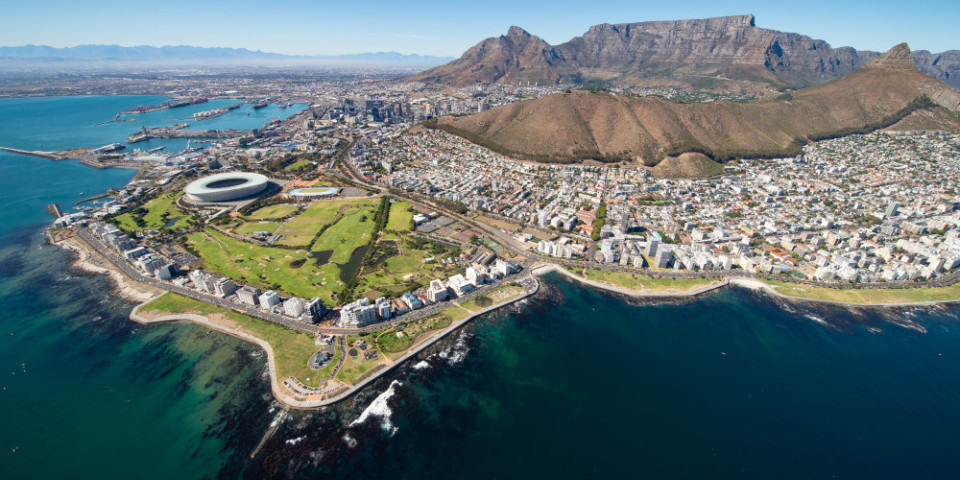


-0450_217_62ab8026512bc.960x480-71.jpg)






